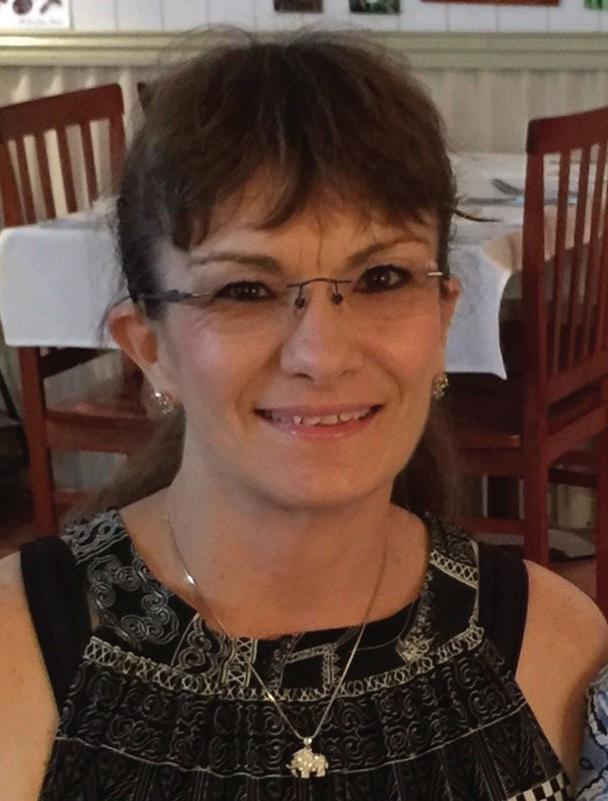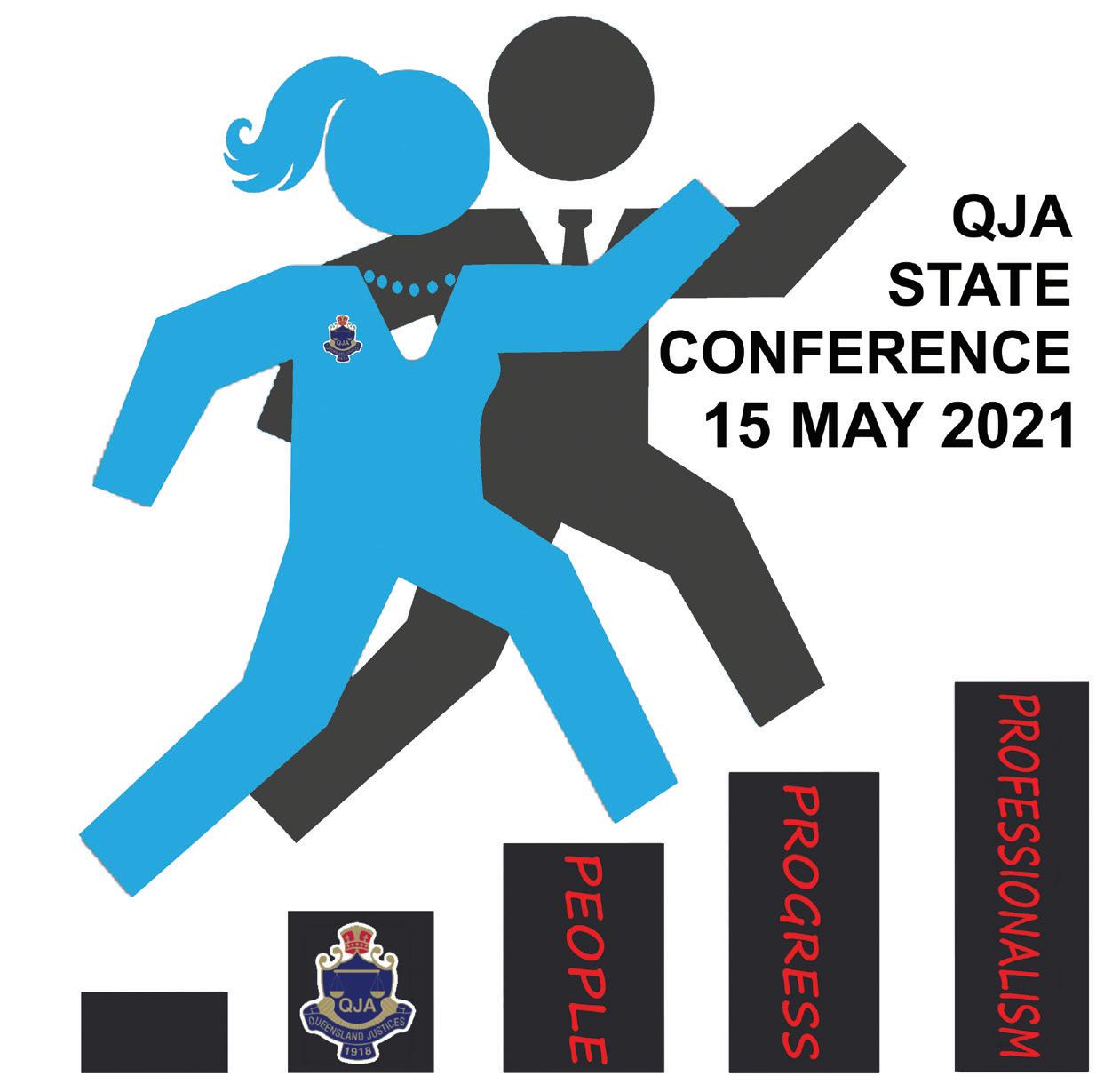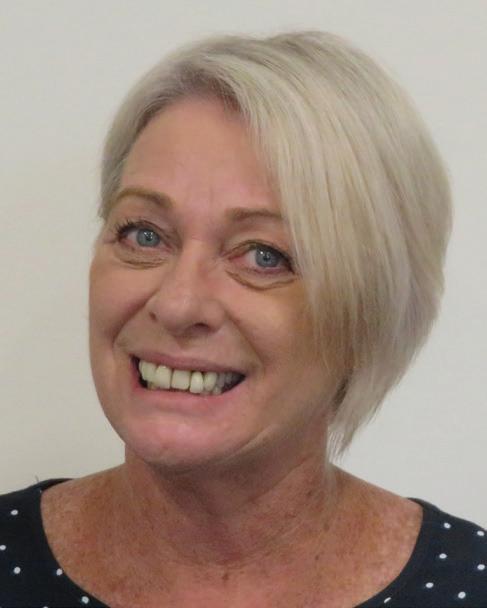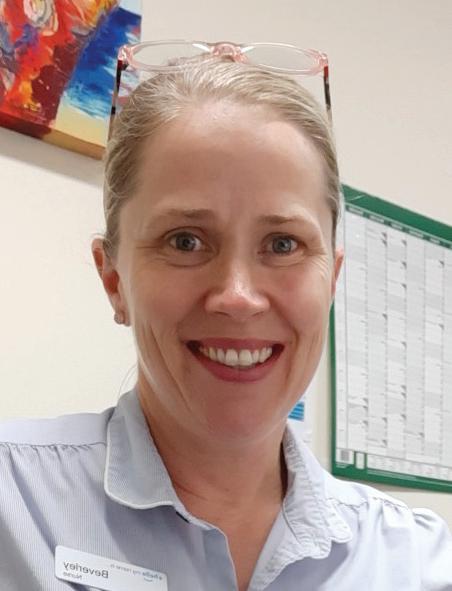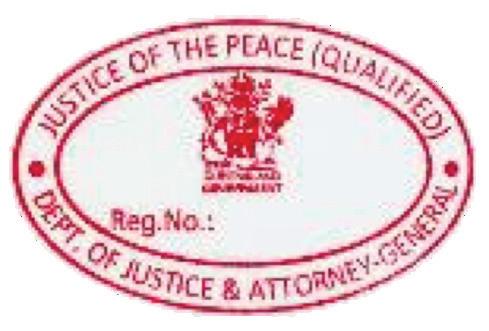11 minute read
ROLL OF HONOUR
Next Article
Members should note that the Roll of Honour recognises the length of Membership of the QJA. Members wishing to receive the official distinguished service certificate as a Justice of the Peace for the State of Queensland should contact their local State Member of Parliament.
The Board wishes to acknowledge the long service given by the following Members.
60 Years QJA Membership Bryan Menhinnitt
50 Years QJA Membership
Graheme Kroll Gerald Moses
40 Years QJA Membership
William Aitkenhead Jacob George Stella Auchter Judith Gibson
25 Years QJA Membership
Valerie Barr Marina Fagg Brian Byrne Christopher Hall Dawn Chilcott Kym Hannant Wayne Dossetto Paul Kelly Maurice Kerrigan Foster Lee Wayne Milner Stanislaw Pipia John Peel
Fay Leadbetter Stephen Mills
Jean Pye Maria Valena Darryl Youngberry
Welcome to New Members The following have joined the QJA since the last Journal:
Gwenda Baker Chrissa Crutchley Andrew Jesberg Carla Mullenberg Maxwell Seymour Erin Barillaro Samantha Curran Lyn Johnson Russell Murr Lena Simpson Peter Baxter Pamela Currie Cameron Johnston Nymphia Naik Jason Slingsby Yoko Bell Rochelle Dalton Brian Johnston Tracey Norman Neil Smith Julie Bell Allyson Davey Judith Jones Kathleen Novacsek Christopher Smith Laura Benesch Paul Drescher Scharcona Jonson-Tomley Nardia Nowell Melanie Smith Brian Bensley Tracy Duffill-Wilson Karen Kelly Patrick O’Brien Shayne Smith Glenys Bentley Benjamin Durance Britt Keough Robert Oldfield Veronica Sommerfeld Penelope Booth Naomi Dwyer Vanessa Kerr Wendy O’Neill Harriet Spence Rodney Bovill Ann-Maree Dyer Jacqueline Knight Helen Overton Katrina Stathooles Tania Brewer Temara Eparaima Gabrielle Kowitz Ravi Parekh Gregory Strohfeldt Peter Brewin Heather Ferguson Lynne Kroger Andrew Parker Darryl Stubberfield Susan Britton Maria Ferraz Neil Laidlaw Thomas Peart Len Symss Howard Broderick Annabel Buchanan Deanne Buenano Paul Cachia Carly Cambridge Shayne Campbell Samantha Campbell Sally Carkeet Pauline Carlton Jesse Chaplin Anh Thu Chau Fiona Fitzsimmons Ashley Fowke Haney Francis Greg Fredericksen Katherine Gado Praveen Gopinath Alexander Green Helen Greenslade Colby Grubb Danielle Hall Hugh Hartwig Tammy Lambert Cathryn Lane Kym Larkin Annette Laubreaux Brendan Lee Adam Lefkon Kira Lloyd-Jones Stevie Lopez Ian Macdonald Kylie Maher Timothy Maiden Liana Pennisi Royston Perkins Kimberley Pettinger Katie Pilcher Alicia Power Jacobus Pretorius Siobhan Rafter Britt Ramage Kayla Randall Patricia Rays Melanie Richards Jonita Tanuvasa Simone Telfer Karen Thiel Mary Thomasson Sharon Todd Krystle Tuppack Jennifer Underhill Correen Vandeventer Juan Pablo Villena Rojas Sonia Vitiello Peter Chow Nina Harvey Bianca Marsham Martin Ridge Christine Wallace Michael Clancy Michael Hayes David Martin Belinda Robinson Donna White Gregory Clark Rebecca Heaton Daniel McCarthy Jamie Rodd Ivan White Russell Cooper Cindy Hetherington Lara McDonald Philip Rogers Jaime Wicks Ben Corling Glenn Hewitt Robert McEwen L-Nishta Roncevich Dean Williams Sarah Cove Howard Hickey Stewart McGettigan Tracey Rooney Jay Wilson Tanya Crabb Sophie Hilber Jack McKenna Suzzanne Roughley Angela Winnett Benjamin Craig Denise Hof Barbara McMullen John Rousseau Declan Winterton Debra Cremer Josie Holland Callum McWaters Sabiha Salsabil Mark Wittich Wendy Crombie Ebony Hoppen Gavin Melaney Michele Sanchez Lorena Wooderson Karla Crossley Bruce Irvine Edi Mian Joanne Sands Michael Zegenhagen Kathleen Croucher Brenda Jang James Morris Darren Sapwell
Q&A (courtesy of the QJA Training & PD Committee)
My job takes me interstate across the country quite a lot. Am I able to witness documents in other states of Australia?
You are a Justice of the Peace or a Commissioner for Declarations for the state of Queensland and the Commonwealth of Australia. This means you can witness Queensland documents or Commonwealth of Australia documents anywhere across the county and anywhere in the world.
I have been approached by interstate visitors who want a document witnessed while holidaying in Queensland. The documents were not Queensland legal documents but legal for their southern state. What should I tell them in these situations?
As stated above in the answer to question 1, you are Justice of the Peace or a Commissioner for Declarations for the state of Queensland and the Commonwealth of Australia. You do not have any authority to witness documents for other States and Territories. However, it is up to the receiving agency as to whether they will accept a document witnessed by a JP from another State. You should advise the client that you do not have the authorly for the relevant State, and warn the client that it will be at the discretion of the receiving agency as to whether the document is accepted or not. The client must decide whether to proceed or not. While it is very common place for interstate agencies to accept the authority of Queensland Justices, you should not give an opinion about whether the document is likely to be accepted or not. If the client agrees to proceed it is best practice to include the words: ‘JP (or C.Dec.) for and in the State of Queensland’ after your signature. This will alert the receiving agency to determine the validity of the document.
What is the process for certifying a booklet as a true copy? Do I have to certify each and every page or is there an easier way?
Yes, each page should be certified. However, it is not necessary to individually date, sign and affix your seal to every page. Once you have sighted the original booklet and satisfied yourself that it is a true copy of the original booklet you can proceed to certify it in the following manner: Check that there are no alterations to the copy, paying particular attention to names, dates and reference numbers. If the pages of the booklet are not numbered, insert a page number at the bottom of each page. It is best practice to notate the numbering using the format page 1 of x page 2 of x and so on. Initial the bottom of each page. On the last page endorse the copy with the following certification:
Q4
A4
Q5
A5
Q6
A6
Q7
A7 This is to certify that this xxx-page document, each page of which I have numbered and signed, is a true copy of the original xxx-page document which I have sighted. Affix your seal and registration number, and sign and date it.
One of my clients was quite insistent that I place him under oath and use a Bible to witness a statutory declaration. I advised him that this was not the usual process and explained the difference between this document and an affidavit. As the client was quite forceful, I agreed to place him under oath and witnessed the document. Does this make any difference?
You are quite correct, Bibles are not required for statutory declarations as they are not sworn or affirmed. However, if a declarant wishes to swear a statutory declaration using a Bible you can accommodate their wishes. It does not invalidate the document.
I often get asked by relatives to witness documents for them. Am I able to do so and under what circumstances should I decline?
While it is not illegal to witness documents for a family member or relative, it should be taken with extra caution in deciding whether to do so or not. It would not be sensible to witness a document for a relative or a close friend if the matter should ever be contested in a court of law. This may place you in a difficult situation if you were to testify against your relative or close friend. This includes witnessing wills for close friends or relatives.
Is it illegal to witness a will for a family member?
While many JPs and C.Decs are asked to witness wills, it is not necessary for the testator to have their signature witnessed by a justice for the will to be valid. For the will to be valid two independent people, who are not beneficiaries, or not the spouses of beneficiaries, must be present when the testator signs the will. It is not wise to witness wills for relatives, even distant relatives, as claims could be made that you influenced the testator if the will is contested in the Supreme Court. Therefore, it is best to refrain from witnessing. You should also refrain if your spouse is a relative of the testator.
I am looking for some advice on how to manage documents, such as affidavits, with attachments. How do I appropriately handle these attachments? I have seen receipts, quotes and even photographs. What is the correct process for witnessing these attachments?
Attachments, also known as annexures, or sometimes called exhibits, that accompany the main document (whether that main document is an affidavit or a statutory declaration) should be handled in the following way: Each attachment should be numbered, it is customary to number them Annexure A; Annexure B; Annexure C and so on. The purpose of the attachments is to support the information contained in the declaration or affidavit that
Q&A (courtesy of the QJA Training & PD Committee)
the client is stating. Each of the attachments should be referred to in the body of the statement being declared, sworn or affirmed. The statement should be annotated with ‘Refer to Annexure A; B; or C as each one is mentioned in the statement. The page numbers on the annexures should be continuous. For example, if there are three (3) annexures of five (5) pages each, then the pages should be numbered from one (1) through to fifteen (15). A cover sheet for the annexures should be included with the wording: The following 15 pages are the annexures marked A, B and C referred to in the affidavit of (insert deponent’s name) sworn/ affirmed before me (insert your name and designation). This … day of … 2020. Then affix your seal.
I am sometimes asked to witness a document but are not allowed to read through it as the persons presenting it says it is very private. Do I refuse to witness it under these circumstances?
Under these circumstances, you could advise the client that you are not interested in the content of the document, but only that it is correctly done in the correct fashion. If the client continues to refuse to allow you to read through the document then you can witness it by writing the words against your signature ‘Signature only witnessed, contents not disclosed’
What are the key points I look for when checking an application for divorce prior to witnessing?
Many divorce applications are completed and filed online these days, so the Justice is likely to be asked to witness the first page of the application which the client will have printed out when making their submission to the court. The client is being asked to swear/affirm that the content of the online submission is true and correct. You should check that the names of both the husband and wife have been provided. Where the client has printed out the whole submission you can check that any questions that cannot be answered in the document are marked ‘not known’ and that the date of separation is at least 12 months. The husband and wife are not required to sign the application at the same time in front of the same Justice and can sign separately.
Is it a requirement that all attorneys are present when an enduring power of attorney (EPA) is being signed by the principal?
No. It is not recommended that the attorney or attorneys be present when the principal is signing an EPA. After the principal has signed the EPA the attorney or attorneys sign to say they accept the power as described in the document. The attorney or attorneys should not sign the acceptance section prior to the principal as this may invalidate the EPA. Further, where there is more than one attorney, they do not have to sign on the same date.
What if a person refuses to swear an oath or make an affirmation when it is required for them to do so? What should I do under these circumstances?
A11 If making an oath or affirmation is a legal requirement
then you are not able to proceed and should decline to witness the document.
Q12 When is the best time to write information into the log, before or after witnessing?
A12 It is preferable to record information within your log prior to witnessing. It is helpful to see the identification document, for example driver licence or passport and record the name immediately so that you are confident of correct spelling. If needing to record additional comments after you have provided your service it is best to do so as soon as practical.
Q13 What is the correct procedure for witnessing an affidavit for a non-English speaking deponent who needs an interpreter?
A13 When an interpreter is required, it is best practice to engage an accredited independent interpreter. However, many deponents rely on friends or family to assist with witnessing documents and do not wish to pay for an interpreter. When approached to witness a document through an interpreter you must establish that the interpreter understands English and the language of the deponent. Once this is established the deponent and the interpreter should be placed under oath or affirmation before proceeding. The interpreter must swear or affirm that they understand the language of the deponent, that they understand English, that they are able to interpret between the deponent and the witness, and that they will provide a faithful translation. After this the document can be witnessed using the usual procedures, albeit the discussions will take place with the interpreter. Before affixing your seal and signing the affidavit of the non-English speaking deponent, you should include a statement in the Jurat, confirming that the contents of the affidavit have been interpreted to the witness. The interpreter should annex an affidavit to the deponent’s affidavit stating:
I understand the English language and (deponent’s language) which is the language of the deponent. I truly interpreted the content of the affidavit of (deponent’s name) before he/she swore or affirmed the affidavit, to the best of my knowledge and skill. (Deponent’s name) appeared to me to understand the content of the affidavit and the oath or affirmation as well as the consequences and penalties for making a false statement. When making an entry in your logbook you should include details about the interpreter including their name, whether they are an accredited interpreter, family member or friend, the language used, and whether they swore or affirmed the oath.

